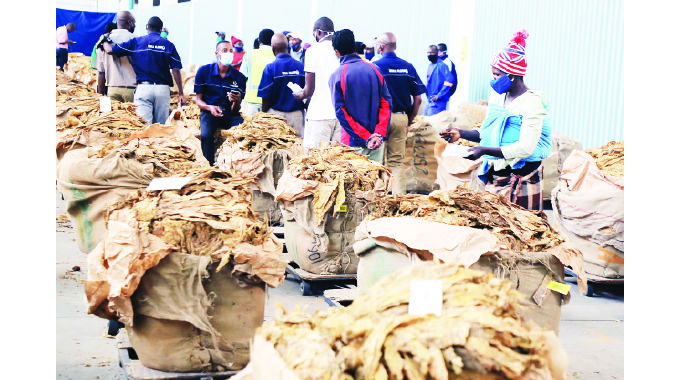Sales decentralisation of tobacco: Vendors cry foul

Elita Chikwati
Agriculture Reporter
Tobacco auction floors used to be a hive of activity, especially in Harare, as farmers would bring their crop and after making their sales go on a buying spree before returning to their farms.
With collections and sales decentralised, there are far fewer opportunities for vendors outside Harare auction floors, especially as mainline businesses are now opening or building branches in the tobacco area towns and their informal sectors are flourishing.
Announcement of the opening of the marketing season was followed by the erection of market stalls outside auction floors in Harare, with people trying to get strategic positions where they could sell as much as possible.
Huge flea markets used to operate, selling food, clothes, school uniforms, farm equipment, fertilisers and furniture, among other things.
Prostitutes and thieves also waited for the season to make money.
With the coming in of Covid-19, things have since changed.
To conform to the World Health Organisation regulations on Covid-19, the Tobacco Industry and Marketing Board together with the Ministry of Health and Child Care instituted regulations that do not allow farmers to come to the floors in huge numbers.
Where families used to come to witness the selling of their tobacco and also to ensure fair sharing of the proceeds, now only few representatives can come to the floors.
The system has also changed and the few farmers who are coming no longer spend time at the floors.
They come, sell and go, leaving the informal traders who used to make a killing stranded.
But as a sign of the times, where the informal traders lose out, companies are opening premises in places like Karoi, Centenary, Bindura, Chinhoyi, Banket and a swathe of small centres so farmers can spend their money nearer home, thereby slashing their transport costs.
Yesterday, the Herald talked to some of the few traders who are still operating.
The traders said Covid-19 had brought misery to their lives as it is now difficult for them to make sales.
The traders said only few farmers visit their stalls to buy goods.
Traders operating outside Boka Tobacco Floors said business had gone down.
Mr Nyasha Kanma said the flea market used to have around 500 traders, but is now left with less than 10.
“We used to have kitchens selling food, some traders selling blankets, clothes and farming inputs,” he said.
“We have gone for three weeks without registering any sale and we are just hoping lady luck will smile on us.”
Another trader, Mr Dennis Mafrauzi, said the tobacco marketing season always presented an opportunity for him to make money.
“I earn a living from the furniture I make and I would make huge sales during the tobacco marketing season,” he said.
“During those few months I would earn enough to sustain me until the next season, but now we have been badly hit by the effects of the pandemic.”
Mrs Jesman Adamu said the situation could have been better if farmers were allowed at the floors but forced to observe regulations such as wearing masks and sanitising.
“I hope this situation will improve,” she said.
“Covid-19 has brought suffering on us. I hope authorities consider revising the regulations so we can also continue with our business and look after our families.”
While traders in Harare are complaining, the situation is different outside the capital as decentralisation of floors has also seen a boost in business in those areas.
Areas such as Mvurwi, Karoi, Rusape and Marondera have seen a boost in informal trading as a result of the decentralisation of auction floors.
The traders said farmers used to buy goods when they sold their crop in Harare, but are now bringing money home and buying locally.







Comments